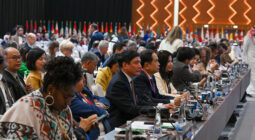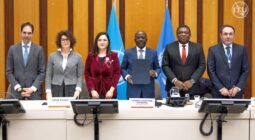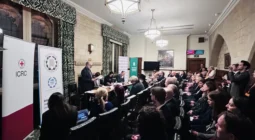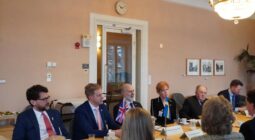

UK MPs visit Moldova at a critical time for the country’s future
A BGIPU delegation led by Anneliese Dodds MP and including Sir John Whittingdale OBE MP, visited Chișinău from 12 to 15 May 2025. This visit came at a critically important time for Moldova. Nationally, it hosts the highest number of Ukrainian refugees per capita of any country, and shares a substantial border with Ukraine (including via the breakaway, Russian-backed region of Transnistria). Of its population of three million, one million Moldovans live outside the country, generally having moved for better economic opportunities.
Last year, the presidential election and a referendum on support for EU membership as a constitutional commitment, were both won narrowly by pro-European political forces. We heard from a number of governing party MPs and government officials the extent to which the outcome had been influenced by bribery of voters as well as disinformation and cyber attacks, all of which were attributed to Russia. This led to concerns that, after many decades of neutrality mixed with varyingly more or less pro-European or pro-Russian sentiment, the parliamentary elections in September would be critical and that Moldova’s future now hangs in the balance.
The delegation were excellently briefed by Ms Fern Horine, the UK Ambassador, and her team, before meeting a variety of politicians, officials and journalists during the trip. Meetings with politicians included a wide-ranging discussion with the President of Moldova, Maia Sandu, and useful scene-setting from the State Secretary for Foreign Affairs; the State Secretaries of the Internal Affairs Ministry and Ministry of Defence; and the lead advisor of the Energy Ministry. It was particularly interesting to hear their assessments on: the geopolitical position of Moldova; current threats to democracy, including disruptive activity such as spates of organised fake bomb threats and the bribing of voters; and the potential future paths for Moldova, including for its political and energy systems. There was also concern about the outcome of the Romanian presidential election due the following Sunday where at the time of our visit there appeared to be a real risk that an extreme candidate who had advocated reintegration of Moldova with Romania might win (although this outcome in the end did not eventuate).
At a parliamentary level, the delegation met with MPs from PAS, the party of the President which currently has a majority in Parliament, and from the official opposition (Socialist party). The UK delegation were particularly grateful to members of Moldova’s UK Parliamentary Friendship Group, who gave up substantial amounts of their time for discussion with UK counterparts during the trip. They were also able to meet with the President of the Parliament, Mr Igor Grosu. These discussions brought home the linguistic diversity of Moldova, with (variously) Romanian, Russian, Ukrainian, Gagauz, Bulgarian and Roma all spoken by many people. They also indicated: the degree of contestation over the representation of historical and current events; the difficulty for decisionmakers seeking to prevent foreign interference while preserving democratic contestation; and the unique and challenging contexts of both the breakaway region of Transnistria (home to hundreds of Russian troops) and the ‘autonomous territorial unit’ of Gagauzia. One highlight was meeting Mr Mihail Druță, an MP who was present at the founding of Moldova as an independent country, who shared with us (as did many Moldovans) his strong support for British political values.
Visits were undertaken during the trip to key agencies including the Center for Strategic Communication and Combating Disinformation, the Central Electoral Commission, the Audiovisual Council and the Cybersecurity Agency. All of these agencies were either new or had relatively new leadership, and it was clear that their dedicated but small staff cohorts were facing an uphill task to guard politics, elections and the media respectively against disinformation, corruption and broader criminality.
Useful context for the delegation was provided by meetings with international organisations working with Moldova’s government, including the NATO Liaison Office and the HALO Trust. Moldova is constitutionally a neutral country, and NATO’s officials were clear about ensuring they operated within that framework, while recognising the challenges for Moldova’s armed forces. The HALO Trust was also focused on the challenges for Moldova’s post-Soviet armed forces in ensuring the security of arms, especially those which might be transited across the republic.
Finally, the MPs were also able to meet with a range of individuals from civil society and investigative journalism. These discussions indicated the substantial negative impact of USAID cuts on media freedom and pluralism in particular, and the critical role that journalists has played in exposing vote-buying schemes and other forms of corruption. They also showed how UK engagement had contributed to the protection of security and of democracy in Moldova, in a variety of ways.
Overall, the delegates were left with the impression of a country hanging in the balance, with intense and well-funded pressure from Russia and its proxies attempting to disrupt Moldova’s European path. Views amongst interlocutors differed about the potential impact of Romania’s elections on Moldova’s politics, but many parallels were drawn between the two countries – not least because Moldovans can, albeit after some bureaucratic hurdles, obtain Romanian passports. On that, final, note of administrative issues, the members of the delegation were left in no doubt about the importance for Moldovans of an easier process for obtaining UK driving licences than that which currently exists.













